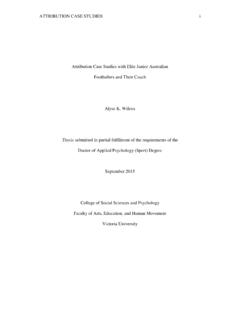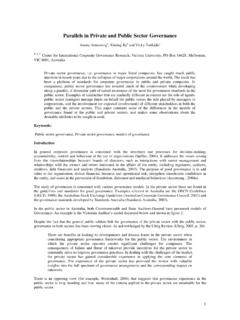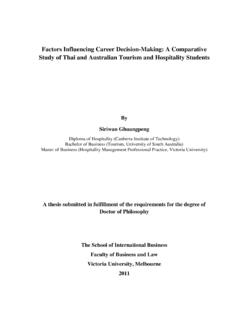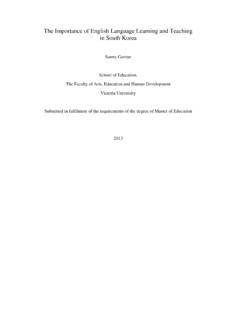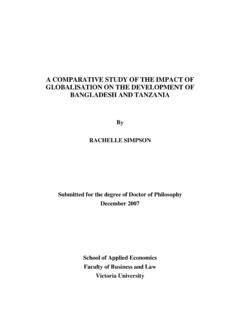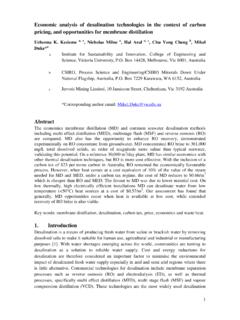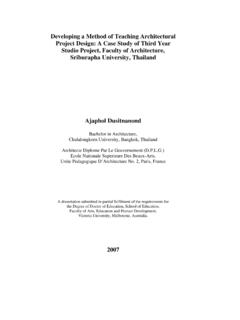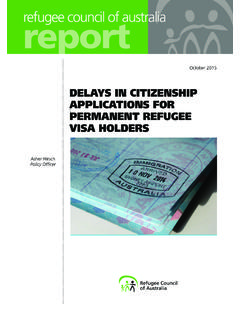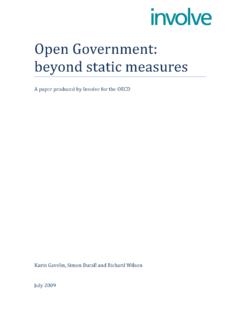Transcription of The Form and Function of Local Government …
1 The Form and Function of Local Government community ~ngagement Initiatives - Swedish Case Studies Peter Mark Demediuk BCom: University of Melbourne MEc, University of New England CPA School of Management & Information Systems Faculty of Business and Law Victoria University Melbourne Australia A thesis submitted in fulfilment of the thesis requirement for the degree of Doctor of Business Administration May, 2010 Abstract The aim of Local governments to increase community engagement is an emergent global phenomenon. Ideally, community engagement initiatives connect the community with their Government so that citizens can have a say in the things that really matter to them. Mounting internal or external pressure for more citizen participation moves the focus from ' Local Government ' to ' Local governance', and presents professional practice with the challenge of determining the ends for participation, and responding with the appropriate means - given the Local economic, social, political and technological context.
2 The purpose of this study is to provide a descriptive analysis of community engagement initiatives by Local governments in order to inform professional practice in a growing but under-researched area of activity. The research aims to conceptualise and articulate factors and characteristics that constitute the 'form' (means) and ' Function ' (ends) of individual community engagement initiatives; identify the shape of these attributes in practice; and provide a management model to fuel debate and inform the planning, implementation and evaluation of community engagement initiatives. The investigation was conducted using case studies of community engagement initiatives in six organisational sites in Sweden as examples of an international phenomenon. Qualitative data was collected through semi-structured interviews with senior public officials.
3 The research findings provide a descriptive analysis of each engagement initiative. The study found that in their quest to connect with the community , each Local Government had settled on experimentation and organic development rather than acquiring or appropriating more fully-formed principles and practices from elsewhere. Each engagement initiative studied provided a unique 'opportunity space' for citizen participation as each employed different means and emphasised a particular mix of ends. These ends were to do with getting good ideas, strengthening and connecting the community , and building a more responsive and sustainable Government . The study and resultant F-quad model suggest that the 'big picture' orientating questions need to be articulated, answered, balanced and communicated before rushing into the realms of an initiative's detail and action.
4 A key issue highlighted across the cases is the need for the ends and means of a particular engagement initiative to fit with the political and managerial frameworks and organisational culture. II Declaration I, Peter Demediuk, declare that the DBA thesis entitled The Form and Function of Local Government community Engagement Initiatives -Swedish Case Studies is no more than 65,000 words in length including quotes and exclusive of tables, figures, appendices, bibliography, references and footnotes. This thesis contains no material that has been submitted previously, in whole or in part, for the award of any other academic degree or diploma. Except where otherwise indicated, this thesis is my own work. WER THESIS DEM 30001010080580 Demediuk, Peter Mark The form and Function of Local Government community engagement initiatives : Peter Demediuk 24/5/2010 111 Acknowledgements This thesis has been undertaken across five years, and represents not only a contribution to knowledge in the field of community engagement, but an immensely enjoyable, interesting and definitive chapter in my professional and personal life.
5 And acknowledgements are appropriate for those who have made it so. I wish to thank Victoria University and the School of Accounting for its support in my research endeavours, and especially acknowledge the encouragement, opportunities and mentorship provided by Professor Rolf Solli from Gothenburg Research Institute in Sweden. There would have been no thesis without the ongoing invaluable commitment, enthusiasm, support, advice, and personal and professional encouragement from my Principal Supervisor Associate Professor Stephen Burgess, , and the incisive thoughts and feedback of my Co-. Supervisor, Associate Professor Graeme Johanson, Thanks go to the various politicians and public officials in the case studies who generously gave their time to be interviewed, and who without exception shared and continually rekindled my enthusiasm for the topic.
6 I also appreciate the knowledge, enthusiasm, interest and encouragement of the many politicians and managers who I have worked with in Australia and Sweden over the past ten years. I acknowledge the incentive provided by my mother Taisa's and her multiple publications in Nature and other great journals - and the continual questions by friends and family around how is it going?, and more often, when are you going to make an end of it? And last but not least, I wish to acknowledge Therese, Tom, Lucy and Sophie's encouragement and forbearance on what has been a long, protracted and bumpy - yet satisfying - journey. IV Publications The following is a list of publications that have arisen from the research undertaken as part of this Professional Doctorate Thesis. These publications have in turn formed a significant basis for the development of the literature review, framework development and case study chapters.
7 1. Demediuk, P. 2010. And What Do You Want for the Future? The International Journal of Knowledge, Culture and Change Management. pp 537-548. 2. Demediuk, P. 2010. Waking Up the Sleeping Town. International Journal of Interdisciplinary Social Sciences. (forthcoming). 3. Demediuk, P . 2010. A Subject to Get You Off the Couch. The International Journal of Diversity in Organisations, Communities and Nations. pp 397-407. 4. Demediuk, P. 2010. Not Just an Innocent Flock of Sheep. The International Journal of Learning. pp 51-65. 5. Demediuk, P. 2010. Participatory budgeting in Local Government : when good intentions collide with organizational culture and systems. Eds: S. Lee and J. Tjakraatmadja. Proceedings of Pan Pacific Conference XXVl 1, Bali, Indonesia. May. 6. Demediuk, P. 2009. Recipes for community engagement in Swedish Local Government .
8 Global Business and Economics Anthology. V. II. December. pp. 226-237. 7. Demediuk, P. 2009. community Engagement in Swedish Local Government : Whose Leaming and What Capabilities? The International Journal of Learning. V. 16. N. 3. pp. 255-271. 8. Demediuk, P. 2009. Innovative community Engagement by Local Government : Harnessing Diversity for Voice, Compromise, and Shared Responsibility. The International Journal of Diversity in Organisations, Communities and Nations. V. 9. N. 3. pp. 51-65. 9. Demediuk, P. 2008. The role of citizens in Local Government decision making. Global Business and Economics Anthology. V. 2. pp. 119-129. 10. Demediuk, P. 2008. The Costs and Benefits of community Engagement by Local Government . International Journal of Interdisciplinary Social Sciences. V. 2, I. 5. pp. 157-163. 11. Demediuk, P. 2008.
9 Rational decision making and satisfycing in modem Local Government . Ed: M. Jalbert. Proceedings of IBFR Global Conference on Business and Finance, San Jose, Costa Rica. May. 12. Demediuk, P. 2008. The Nature and Impact of community Engagement: Comments on the Literature. Eds: S. Lee & G. Selva. Proceedings of Pan-Pacific Business Conference, San Jose, Costa Rica. June. v Glossary of terms Accountability (U4 2009) answering to a higher authority for one's actions Agenda setting (Shafritz, Russel & Borick ideas and issues percolate through channels to become 2009) considered for policy and action Autopoietic systems (Luhmann 2005). organisations live off lessons from past decisions ' community engagement (Bayside Council the ideal and practice of citizen participation where 2009) governments connect with people in the development and implementation of policies and programs community (or Local ) governance (Epstein et arrangements for public decision making that embody an al.)
10 2005; Stoker 2004) authentic role for citizens. Deliberation and deliberative democracy participation that goes beyond information exchange and (Lukensmeyer & Torres 2006) facilitates active citizen involvement in discourse, finding shared priorities, learning, and decision making Decision making (Simon 1977) finding occasions, finding alternatives, making choices note: hyphenated when used in conjunction and evaluating what happens with other terms decision-making processes E- Government (and e-voting and e-engagement) technologies that provide opportunities for two-way (Macintosh 2007) interaction between the institution and the public Evaluation (Shafritz, Russel & Borick 2009) any systematic assessment of activities and effects Governance (2005 p. 16) the arrangements that determine decisions and action Instrumental argument reasoned to achieve an end or to pursue one's desires Invited space (Cornwall & Coelho 2006) (see opportunity space) Isomorphism (DiMaggio & Powell 1983).
